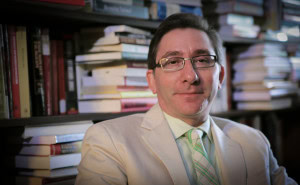AHA members are involved in all fields of history, with wide-ranging specializations, interests, and areas of employment. To recognize our talented and eclectic membership, AHA Today features a regular AHA Member Spotlight series.
 Peter A. Blitstein is an associate professor and the chair of the department of history at Lawrence University. He lives in Appleton, Wisconsin, and has been a member since 1999.
Peter A. Blitstein is an associate professor and the chair of the department of history at Lawrence University. He lives in Appleton, Wisconsin, and has been a member since 1999.
Twitter handle: @pblitstein
Alma maters:
I have a BA in political science and Russian from Johns Hopkins, an MA in political science from UC Berkeley, and a PhD in history from UC Berkeley.
Fields of interest: modern Russian political and social history, nationalism and ethnicity, historical theory, and Cold War intelligence and espionage
When did you first develop an interest in history?
I can’t remember a time when I wasn’t interested in the past. As a child I was fascinated by my grandfather’s stamp collection and obsessed with old movies. But my interest in history developed quite late. I started graduate school in political science expecting to become a Sovietologist, but the Soviet Union collapsed and entered history. I followed it soon after, transferring into the history department and completing my doctorate there.
What projects are you working on currently?
I’ve found myself increasingly drawn into administrative work, and so my current project is crafting an understanding of the challenges faced by the liberal arts today and how college and university leaders can defend them. I spent the 2013–14 academic year on an American Council on Education fellowship with this goal in mind. And I’m continuing to work on historical scholarship, including a book project on the history of Soviet nationality policy and a pair of articles on the challenges of being a non-Russian historian in the Soviet Union. I’m also a collaborator on the Stalin Digital Archives Project at Yale University Press.
Have your interests changed since graduate school? If so, how?
I work at a small liberal arts college; teaching is at the center of my practice of history. As a result, I’ve become more interested in questions of historical epistemology, method, and pedagogy, of how to teach and understand historical thinking, than I was back then, when my focus was much more on the nuances of interpreting what happened and why. I’ve also developed an interest in Cold War intelligence history as a teaching field. What began as a tactic to lure students into a Russian history course has turned into a more serious (and seriously fun) endeavor.
Is there an article, book, movie, blog etc. that you could recommend to fellow AHA members?
I’m a fan of Timothy Burke’s (Swarthmore) blog Easily Distracted; he covers teaching history, issues in higher education, and his own field of African history, among other things, and I find his vantage point (coming from another liberal arts college person) refreshing and insightful. For fellow AHA members who read historical fiction and/or espionage fiction, I would recommend Alan Furst’s novels. Furst evokes a sense of time and place—interwar Europe in crisis—better than most professional historians I know.
What do you value most about the history profession?
It offers an intellectual orientation to the world which enables us to question assumptions that things are how they have always been and that change isn’t possible. Politically, that’s important to me. I’ve also found that thinking like an historian gives me a distinct perspective in committee meetings and informal conversations about issues facing the college.
Why did you join the AHA?
I joined because it was necessary to get a job as a history professor. I continue to belong because the AHA connects me to the profession and advocates for the value of historical knowledge in our society, which is especially important today when the humanities are under assault more than ever. I also appreciate the AHA’s Tuning Project, which articulates what history majors should be learning.
Do you have a favorite AHA annual meeting anecdote you would like to share?
I suspect that like many AHA members, my memories of annual meetings center on the job market and are not very pleasant. One exception, however, was getting into an argument with an interviewer about Weber’s Protestant Ethic’s suitability as a text for first-year students. Though I wouldn’t recommend this tactic, I did get hired in the end … something my senior colleague continues to remind me about to this day.
Other than history, what are you passionate about?
The New York Yankees and Niko, my Shiba Inu.
This post first appeared on AHA Today.
This work is licensed under a Creative Commons Attribution-NonCommercial-NoDerivatives 4.0 International License. Attribution must provide author name, article title, Perspectives on History, date of publication, and a link to this page. This license applies only to the article, not to text or images used here by permission.